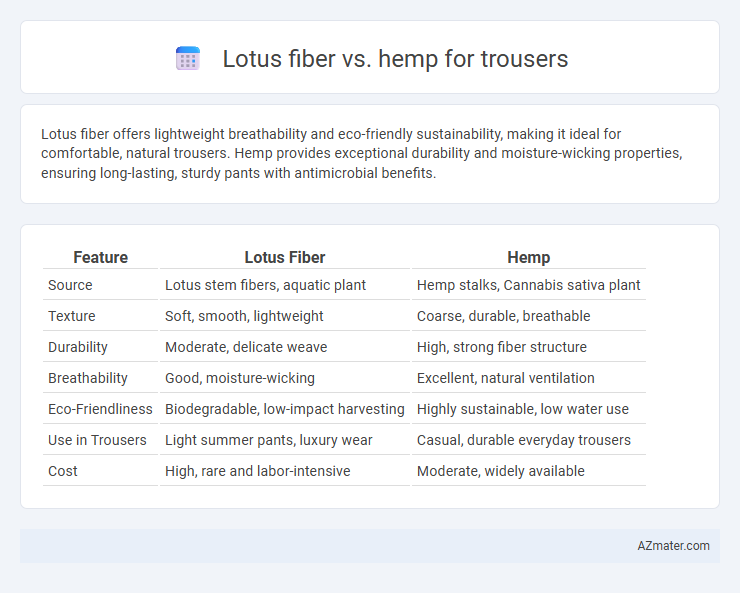Lotus fiber offers lightweight breathability and eco-friendly sustainability, making it ideal for comfortable, natural trousers. Hemp provides exceptional durability and moisture-wicking properties, ensuring long-lasting, sturdy pants with antimicrobial benefits.
Table of Comparison
| Feature | Lotus Fiber | Hemp |
|---|---|---|
| Source | Lotus stem fibers, aquatic plant | Hemp stalks, Cannabis sativa plant |
| Texture | Soft, smooth, lightweight | Coarse, durable, breathable |
| Durability | Moderate, delicate weave | High, strong fiber structure |
| Breathability | Good, moisture-wicking | Excellent, natural ventilation |
| Eco-Friendliness | Biodegradable, low-impact harvesting | Highly sustainable, low water use |
| Use in Trousers | Light summer pants, luxury wear | Casual, durable everyday trousers |
| Cost | High, rare and labor-intensive | Moderate, widely available |
Introduction to Lotus Fiber and Hemp
Lotus fiber, derived from the stems of lotus plants, offers a lightweight, breathable, and eco-friendly alternative for trousers with its natural moisture-wicking and antibacterial properties. Hemp, known for its durability and strength, provides a robust and sustainable fabric choice that becomes softer with every wash while maintaining excellent UV protection. Both fibers contribute significantly to sustainable fashion, with lotus fiber excelling in luxury apparel and hemp widely used for versatile, long-lasting trousers.
Historical Use of Lotus and Hemp in Textiles
Lotus fiber has been used for centuries in Asian cultures, notably in Myanmar and India, for creating lightweight, breathable fabrics ideal for trousers that offer natural moisture-wicking properties. Hemp, with a textile history dating back over 10,000 years, was traditionally used globally, especially in China and Europe, prized for its durability, resistance to pests, and eco-friendly cultivation. Both fibers have seen resurgence in sustainable fashion, with lotus fiber valued for its softness and rarity and hemp appreciated for its strength and antimicrobial qualities.
Sustainability: Lotus Fiber vs. Hemp Production
Lotus fiber production requires fewer pesticides and less water compared to hemp cultivation, making it a more sustainable choice in regions with limited resources. Hemp grows rapidly and captures more CO2 per hectare annually, contributing significantly to carbon sequestration. Both fibers offer biodegradable options, but lotus fiber's low-impact harvesting process supports biodiversity by minimizing soil disruption.
Comfort and Breathability for Trousers
Lotus fiber offers exceptional breathability and moisture-wicking properties, making it ideal for trousers worn in warm climates, while its natural softness enhances overall comfort. Hemp is known for its durability and breathability, providing strong airflow and temperature regulation, but it can feel coarser compared to lotus fiber. For trousers prioritizing lightweight comfort and high breathability, lotus fiber typically outperforms hemp in softness and ventilation.
Durability and Longevity Comparison
Lotus fiber trousers exhibit moderate durability with a smooth texture, but they tend to be less resistant to abrasion and wear compared to hemp. Hemp fabric stands out for its exceptional strength, resistance to tearing, and long-lasting structure, making it more suitable for trousers subjected to frequent use and harsh conditions. Over time, hemp trousers maintain their shape and integrity better, offering superior longevity in everyday and rugged wear scenarios.
Aesthetic Qualities: Texture, Color, and Finish
Lotus fiber offers a smooth, silky texture with a natural sheen, lending trousers a refined and elegant finish that enhances the garment's luxury appeal. Hemp provides a coarser texture with a matte appearance, contributing to a rustic and earthy aesthetic favored in casual or eco-conscious fashion. The natural color of lotus fiber ranges from creamy off-white to pale beige, complementing soft, muted tones, while hemp's color varies from light tan to deep olive, offering a more robust and organic palette for trousers.
Cost and Accessibility
Lotus fiber trousers typically come at a higher cost due to the labor-intensive extraction process and limited production scale, making them less accessible compared to hemp. Hemp trousers offer affordability and wider availability thanks to established cultivation methods and a robust market presence. Consumers seeking cost-effective and readily accessible options often prefer hemp over lotus fiber for trousers.
Eco-Friendliness and Environmental Impact
Lotus fiber and hemp both offer eco-friendly alternatives for trousers, with hemp being more widely recognized for its low water usage, rapid growth cycle, and natural pest resistance that reduces pesticide need. Lotus fiber production involves harvesting from lotus stems in wetlands, promoting wetland conservation but resulting in a labor-intensive process with lower yield compared to hemp. Hemp's carbon sequestration capability and biodegradability make it a superior choice for sustainable fashion, while lotus fiber's unique texture provides an eco-conscious option supporting traditional craftsmanship and biodiversity.
Care and Maintenance for Lotus and Hemp Trousers
Lotus fiber trousers demand gentle hand washing or delicate machine cycles with mild detergents to preserve their natural texture and prevent fiber damage. Hemp trousers exhibit high durability and can withstand regular machine washing, but should be air-dried to maintain fabric integrity and reduce shrinkage. Both materials benefit from avoiding bleach and high heat during ironing to ensure longevity and fabric quality.
Final Verdict: Best Choice for Trousers
Lotus fiber offers superior breathability and moisture-wicking properties, making it ideal for lightweight, comfortable trousers in hot climates. Hemp provides exceptional durability, natural UV resistance, and anti-bacterial qualities, perfect for trousers requiring longevity and rugged use. For everyday wear balancing comfort and resilience, hemp is the best choice, while lotus fiber suits premium, eco-friendly trousers geared towards summer wear.

Infographic: Lotus fiber vs Hemp for Trousers
 azmater.com
azmater.com